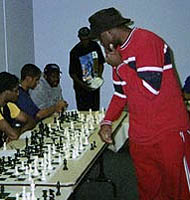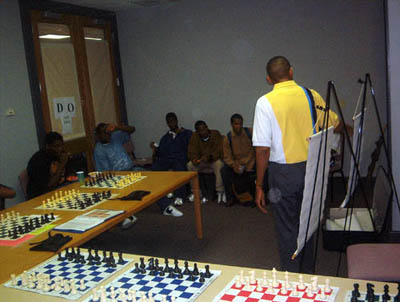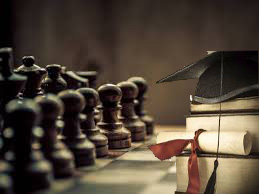Chess at America’s HBCUs

Chess on collegiate campuses has been traditionally a way to pass time in between classes or to merely blow off steam from the rigors of academic study. A natural bonding activity, chess in America has not found much of a following on the universities and campuses across the land. According to the Association of American Colleges and Universities, there 2618 accredited four-year colleges and universities. Out of this number, less than 100 have active chess clubs today.
According to Robert John McCrary, collegiate chess took hold in the beginning of the 1800s and about a century later was formalized in the Ivy League schools on the country’s east coast. Chess bore a tradition stemming from European roots and was played by the descendants of the first settlers in America. It was during these times that the country was going through social change which included the abolition of chattel slavery.
Despite the brutality of chattel slavery for 300 years, there were certain pastimes that slaves were exposed to in the racially-contentious time. One of the sons of slavery James McCune Smith had written an essay about chess and demonstrated his passion in elegant prose. This passion was also held by Theophilus Thompson of Maryland, who became of the first Black player of note and proceeded to publish a book of endgame compositions.
Chess at Historically Black Colleges & Universities

IM Oladapu Adu giving exhibition at Howard University
During the 19th century, many of the Historically-Black Colleges and Universities (HBCUs) were being formed. Slavery was an enterprise prevalent in the north but dominant in the southern states. After its abolition in 1865, many institutions were formed to provide slaves and their descendants with formal training. However, chess did not have much of a tradition in the southern states (except for Paul Morphy’s short, but brilliant run).
While Cheyney State University stands as the oldest HBCU founded in 1837, some of the well-known schools remain, Morehouse, Spelman, Howard, Hampton, Florida A&M (FAMU), North Carolina A&T, Tuskegee, Clark Atlanta, Southern, Grambling and Tennessee State. There are more than 100 HBCUs and only Tuskegee and Howard have had extensive chess activity in the past few years.
Tuskegee and Howard played an online match which was won by Howard. Howard has also invited IM Oladapo Adu to campus; Tuskegee invited IM-elect Stephen Muhammad. More recently Grambling University in Louisiana has started a chess club and are looking for lecturers. Florida A&M (the largest HBCU) has had activity in the past, but currently remains dormant. In a bit of HBCU history… FM William Morrison once attended Morgan State University and took his chess reputation to the streets where he gained his moniker, “Exterminator.”
Problems Marketing Chess at HBCUs
HBCUs have to face a number of different hurdles in forming a viable chess community. Three main problems are:
- Lack of chess tradition in many of the cities hosting HBCUs. A large majority of the HBCUs are situated in the south, and many of these campuses are in small towns. Many of these towns thrive on the traditional college activities. Chess is viewed as too esoteric and exclusively for elites. College students may shy away from activities that seem to add to the intellectual pressures they already face. Of course this is only a perception. Tuskegee has been able to build an environment despite being in a small town.
- Lack of experienced players. While there are many players who may know something about chess, there are a handful who have been involved to the extent that they want to formalize chess activities. Chess Clubs tend to be very difficult to market successfully, but with dedicated members, they can develop stability. Howard has developed such a model and has developed a reputation on campus through aggressive marketing efforts.
- Lack of mentorship. The schools that do attract players from chess-playing states may be hard-pressed to find an advisor who knows anything about chess. If there is such a faculty he/she may not be active in the chess community and will not understand how to integrate formalized activities into the club. Recently, North Carolina A&T hosted GM Maurice Ashley in Greensboro to share his passion with the Black community. These activities will provide inspiration and encouragement, but they are not nearly enough to spur any lasting initiatives.
The problems above come from a number of different angles.
It goes without saying that Howard University (in the nation’s capitol) is one of the more active chess clubs among HBCUs. This is due to the fact that the Washington, DC/Maryland area has perhaps one of the richest traditions pertaining to Black chess. The university has access to strong players and there are many tournaments held throughout the year on the east coast. For the first time, Howard University participated in the Pan-Am Intercollegiate tournament in 2003.
One of the main problems with chess programs in American K-12 is its structure and lack of facility for producing enthusiastic players. These programs place great emphasis on chess as an academic tool, but little emphasis on instilling passion for the activity. Thousands of children learn to play during K-12, only to drop it by the time they reach high school. Schools typically have coaches with very little experience and understanding.
HBCUs in Perspective
HBCUs offer a rich and supportive environment from which they can examine the world from a decidedly different perspective. This provides a distinct advantage of two perspectives… the dominant paradigm and the indigenous paradigm. There are many activities popular at HBCUs, but chess has not traditionally been one of them. Chess still suffers from being perceived as an activity for high-class, brainy, White males. The media continues to portray chess in this paradigm. Apart from the few movies where people of African descent are depicted playing chess (or a variant), there is not much reinforcement.

IM-elect Stephen Muhammad at Tuskegee University.
Often I will run across a student (I teach at Florida A&M) who tells me that they played chess in middle school and won trophies. It is very difficult to determine what these trophies actually meant and why they no longer played. There are countless students who know how to play chess, but there is no initiative to formalize activities. What needs to be done in order to spur interest in chess activities? There are a number of different ideas. Perhaps occasional online matches or an HBCU Chess League.
Recently, I received an e-mail that someone forwarded to me. It was an e-mail from Grambling University to the United States Chess Federation. The school had just formed a chess club and was looking for a Master to visit and provide some advice. In 2003, Tuskegee was able to invite Stephen Muhammad due in part to the e-mail exchanges between me, the chess club President (Jack Wilson) and Dr. Steven Dowd, Faculty Advisor. That sparked enthusiasm and led to the aforementioned chess match with Howard. Here is what I suggested when asked how to strengthen Tuskegee’s chess club:
There are some basic recipes of success for chess clubs. First, you have to have a dedicated core of experienced players. If that isn’t the case, you need to invite strong players in to provide an incentive for people to come out. Your location must be visible and the meetings must be consistent! The other problem is the fact that schools do not place a lot of attention to chess as a integral part of the student culture. It is considered enigmatic and only for intelligentsia. This is false so you must work to educate the campus on chess in “down-to-earth” ways. You may have to convince an influential person on the administration that chess has value… one who can pull some purse strings. Maybe that’s the President… maybe it’s the Dean of Students… maybe it’s the Dean of Business! Who knows? Someone influential.
In revisiting these comments, it may be better to say that a chess club must have “enthusiastic” players as opposed to “experienced.” In addition, it is important to have freshman and sophomores as officers in order to keep the organization fresh and to take pressure off of upperclassmen who may be busy trying to graduate.

There is a lot of footwork to be done such as paperwork for recognition as a student organization, a reliable advisor and creative way to market chess as an activity that is accessible to the public. Play outdoors in the quad or courtyard; play in the dining area; play in the grass; have a Master hold a simultaneous exhibition in the student center; play where the President can see you! Fortunately, being intelligent is not a stigma in college and at HBCU campuses more players are beginning to rekindle that interest garnered from K-12 days.
Composed: 15 November 2006
